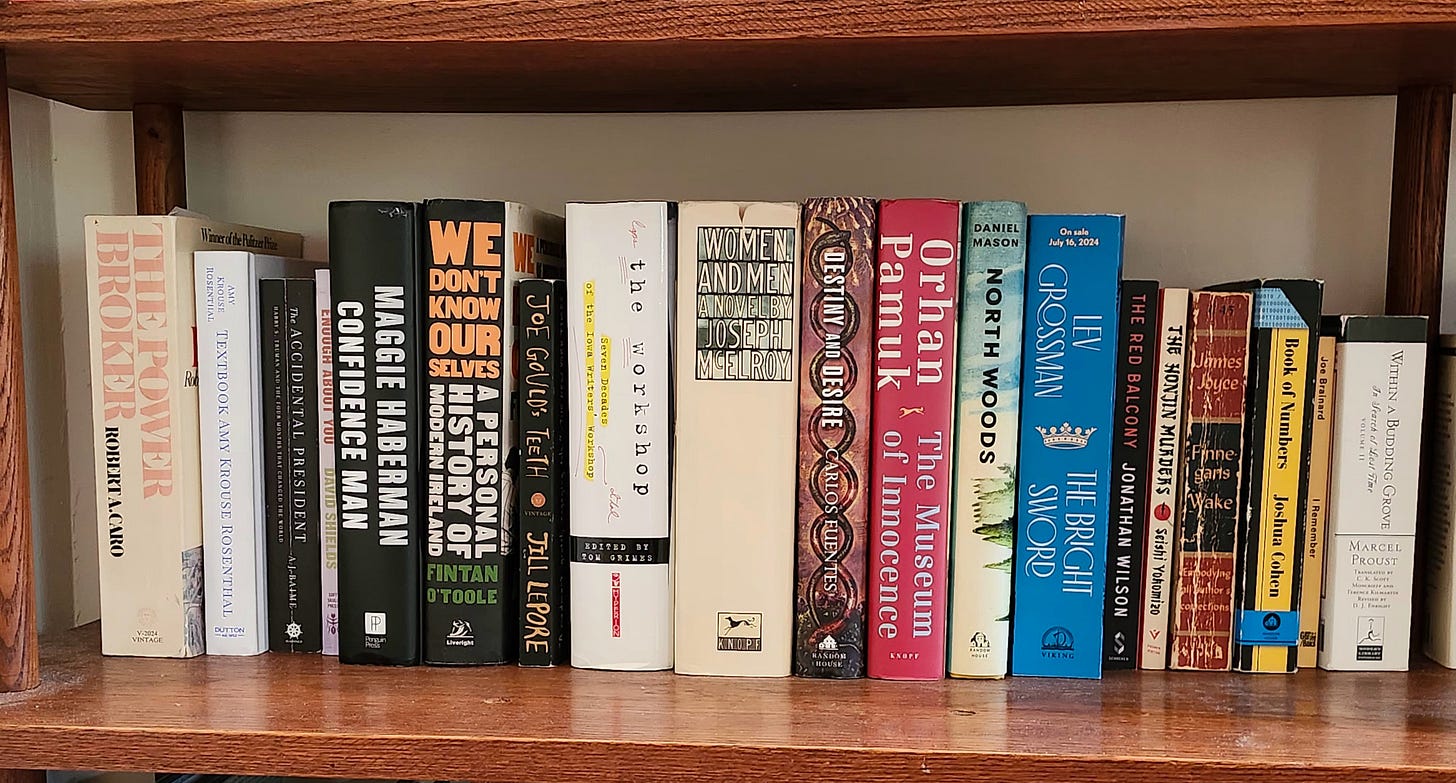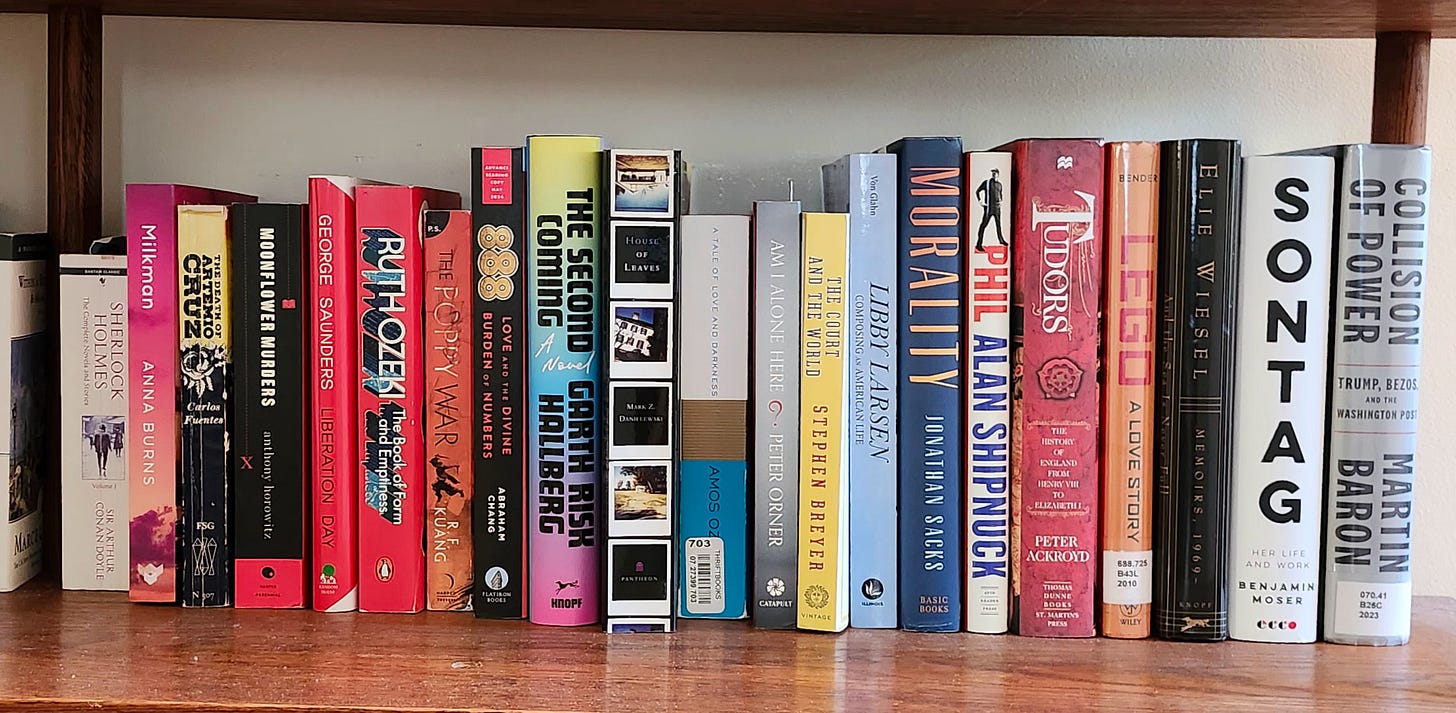I’m finding that one shared attribute of my “Poetic Musings” posts is that each one has at least one suggestion for you, my reader. Sometimes it’s a poem to read, a TV program worth your time, an arts event in the Boston area, or a book to read. This post, despite its title, is not precisely a book suggestion (although indirectly I’ll provide dozens of them). Instead, I want to let you know about a favorite space in my home, one that I recommend all book lovers should seek to replicate in some fashion.
The middle shelf of my second-floor bookcase I have officially designated as my reading on-deck circle. Over time, I had collected any number of books that I vowed I would read sometime in the future. The books made their home practically anywhere in my house until I decided to place them all on their own bookcase shelf, which slowly but surely became filled.
At that point, I instituted the rule that added magic to the whole idea: From that point forward, whenever I acquired a new book, usually from a library used book sale or a Little Free Library, I carefully looked over my on-deck circle and found a book to remove, one that usually had been on the shelf for months without ever insisting, “Read me next!” The book that left the shelf left my house as well, generally finding its way to my Little Free Library.
So, anytime I finish reading one book and am looking for another to read, I have upwards of four dozen contenders on the shelf. And anytime I walk from my third floor to my first floor or vice versa, I check the shelf out in gleeful anticipation of reading pleasures awaiting me.
Notes on some of the current shelf inhabitants (Click on the pictures to see more clearly each title):
The Power Broker; Robert Caro - I very much enjoyed the first 298 pages of this magisterial biography of Robert Moses, who for better or for worse remade New York City by displacing neighborhoods for highways. Then I ran out of gas and set it aside about a decade ago. Every time I consider bumping it from the shelf, I pick it up and read a paragraph or two and remember how good this book is. The bookmark is still in place so I can pick up where I left off, helpful for a book that runs 1,162 pages.
The Accidental President: Harry S Truman and the Four Months That Changed the World; A.J. Baime - I loved David McCullough’s Truman biography, particularly the story of when Truman became president and then and only then learned about the Manhattan Project. I’ve always thought I might re-read McCullough; instead now, I can read Baime’s book, which is wholly about that period and Truman’s moral dilemma: to bomb or not to bomb.
Enough About You; David Shields - Shields is the author of one of my favorite books about the art of literature, Reality Hunger, where he argues essentially that narrative fiction has run its course and that various hybrid genres do a better job of conveying idea and character, including and especially lightly fictionalized memoir. Any time I can pick up a Shields title I haven’t read yet, I grab it.
Destiny and Desire; Carlos Fuentes - I read and enjoyed a lot of Fuentes in the 1980’s. Along the way I read a piece that suggested that everything Fuentes had ever written or would ever write fit into an overall 15-part structure. So, I vowed to collect and read them all. Fuentes has passed away, without I suspect ever getting to the end of his project, so I should just jettison this title, but it survives on my shelf, tempting me to at least research whether he reached his goal
Finnegans Wake; James Joyce - The great unread novel. I need to find a Talmudic-like study group willing to read a page or two a day and then maybe, just maybe, I can tackle this.
Book of Numbers; Joshua Cohen - I started this in hard-cover with a copy from the library and stopped 75 pages in. I started it again as a book-on-CD that I picked up at a used-book sale and stopped at roughly the same point. I picked up the paperback at another used book sale and here it sits in my on-deck circle. Cohen wrote a novel recently about Benjamin Netanyahu’s father which I enjoyed, so I’m not quite ready to say goodbye to Book of Numbers
I Remember; Joe Brainerd - One quirk of my “what to read next” system is that I have separate bookshelves for poetry, for plays, and for teaching-related books. These shelves have plenty of books I’ve yet to read. Brainerd’s book, which I suspect David Shields would applaud, is a memoir told entirely in separate mini-paragraphs, some a mere sentence, all of which begin “I remember.” The book reads like a prose poem, which allows me the luxury of relocating it to my poetry bookshelf to make room for a new title in the on-deck circle.
Within a Budding Grove; Marcel Proust - No one finishes Proust, right? No matter how amazing it is, right?
Milkman; Anna Burns - I will read this Booker Prize winning novel (which has spent 11 months on my shelf) next. Why? I’m reading a book a month as part of the Massachusetts Center For the Book. Each month I read a title which fits a specific category; for August, it’s a book that begins with the first letter of my birthday month. I’m a May baby, thus Milkman.
The Second Coming; Garth Risk Hallberg - The latest from the author of City on Fire, and a gift from my son, whose job at a Barnes and Nobles means I anticipate with pleasure more books to mark birthdays and Father’s Days. Thanks, Daniel!
House of Leaves; Mark Z. Danielewski - I can’t even begin to summarize what this book is about, so I’ll let Wikipedia do the job. Even their summary doesn’t begin to do justice to the weirdness, especially typographical, of this book:
The novel is written as a work of epistolary fiction and metafiction focusing on a fictional documentary film titled the Navidson Record, presented as a story within a story, discussed in a handwritten monograph recovered by the primary narrator, Johnny Truant. The narrative makes heavy use of multiperspectivity as Truant's footnotes chronicle his efforts to transcribe the manuscript, which itself reveals the Navidson Record's supposed narrative through transcriptions and analysis depicting a story of a family who discovers a larger-on-the-inside labyrinth in their house.
Phil; Alan Shipnuck - A recent (Unauthorized!) biography of golfer Phil Mickelson. Even I need an occasional break from quirky postmodernist novels.
Sontag; Benjamin Moser - Conversely, whose life story epitomizes the overall look and feel of my bookshelf more than Susan Sontag?
Post-Script:
Writing this post brought to mind a 2002 documentary that would particularly appeal to book lovers, Stone Reader. In it, documentarian Mark Moskowitz tracks down a one-and-done author Drew Mossman, whose Stones of Summer Moskowitz read with appreciation 30 years previously. Along the way, Moskowitz’s film is an homage to books and reading. One particularly memorable scene features a private home library where I found myself dying to know just what books were on that shelf. Moskowitz, anticipating my needs, lists all of them in the credits to his film. An early example of what many of us did during Zoom TV interviews during the pandemic, namely check out the books on display behind the interviewee.




If I were surveying readers about their reading habits, one question I would ask is, "How many books do you own that you at least tentatively plan to read sometime in the future?" For readers with ten or more, I'd extol the pleasures to be gained from giving them their own home, even if it's just a bed stand. For those with less, I'd encourage them to build up their collection of unread books, so that they have a wide variety of options when the inevitable question of what to read next arises.
Looks like a good shelf! I just have piles of books that travel around with me. I am not as organized.